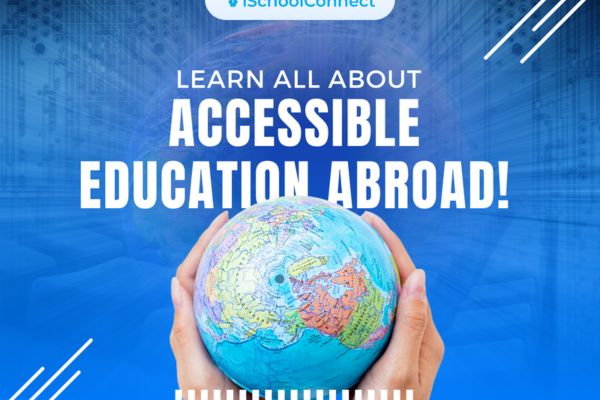Table of Contents
Breaking barriers through accessible study abroad programs
Studying abroad can be a fulfilling experience that opens doors to new cultures, languages, and perspectives. This opportunity may seem daunting due to concerns about accessibility and support for students with disabilities. The global education community is making strides in providing inclusive programs that cater to the unique needs of these students. In this blog, we will explore accessible study-abroad programs, the challenges faced by a students with disability, and the support systems available to make their overseas education dreams a reality.
The importance of accessibility
Regardless of their physical or cognitive abilities, all students can enroll in accessible study-abroad programs. Through these programs, disabled students have the opportunity to explore the world and expand their horizons through international education. Inclusive programs align with the principles of diversity and equity and contribute to a more diverse and enriched global learning environment. Here are a few factors that prove the significance of accessible programs-
- Diverse perspectives- When students with disabilities participate in study abroad programs, they bring unique perspectives to the table, enhancing the overall academic experience for both themselves and their peers.
- Skill development- International education fosters personal growth, and the skills acquired are invaluable for future careers. Students with disabilities deserve the same opportunities to develop these skills.
- Advocacy and awareness- Inclusivity in study abroad programs helps raise awareness of disability issues on a global scale and empowers students to become advocates for change.
Challenges faced by students with disabilities

Studying abroad presents various challenges for all students, but for those with disabilities, these challenges can be more pronounced. Here are some of the common obstacles they encounter-
- Many countries and institutions may not have fully accessible facilities. It is difficult for students with mobility issues to navigate the campus and their surroundings.
- There is a limit to necessary accommodations, such as sign language interpreters or accessible course materials in some study-abroad destinations.
- Maintaining healthcare and medication routines can be complicated in foreign countries, especially when specific medications or treatments are not readily available.
- Some cultures may lack awareness or understanding of disability issues, potentially leading to stigmatization and exclusion.
Comprehensive support systems
Now that we know the challenges that students with disabilities face while studying abroad, let’s explore the comprehensive support systems and resources available to them-
- Pre-departure planning- Institutions offer pre-departure orientations that include information about accommodations, healthcare options, and cultural awareness.
- Disability services- Most universities and study abroad organizations have dedicated disability services offices that work with students to ensure they receive the necessary accommodations and support.
- Accessible housing- Accommodations, such as wheelchair-accessible housing or rooms with specialized equipment, are often available to students with disabilities.
- Local partnerships- Study abroad programs frequently partner with local organizations and institutions to provide additional support and resources, such as accessible transportation and medical care.
- Legal protections- International conventions and local laws may protect the rights of students with disabilities, ensuring they receive fair treatment and accommodation.
- Scholarships and grants- Various scholarships and grants are available specifically for students with disabilities, helping to offset the costs associated with studying abroad.
- Peer support- Connecting with other students who have gone through similar experiences is essential for students with disabilities. Many universities have peer mentoring programs to provide guidance and support.
Accessible study-abroad programs
Here are a few accessible study-abroad programs that are beneficial for disabled students.
- Mobility International USA (MIUSA) – A non-profit organization, MIUSA, specializes in international exchange programs for people with disabilities. They provide information on various accessible study-abroad opportunities.
- American Field Services (AFS-USA) – Students with disabilities who wish to study abroad can apply for scholarships and programs at AFS. They have a commitment to making their programs inclusive.
- Council on International Educational Exchange (CIEE) – Since 1947, the nonprofit study abroad and intercultural exchange organization CIEE has brought the globe together, furthering peace by erecting bridges of mutual understanding between various people, countries, and cultures. CIEE offers a range of study abroad programs and provides support for students with disabilities, including accommodations and accessible facilities.
- IES Abroad – As a leading non-profit organization abroad and internship provider, IES Abroad sets the highest academic quality requirements. IES Abroad is famous for its dedication to diversity and inclusion. They offer support and accommodation for students with disabilities in their study abroad programs.
- School for International Training (SIT) – For over 50 years, the School for International Training has been preparing students to be effective leaders, professionals, and citizens via experiential education and intercultural engagement. SIT offers a variety of study abroad programs and commits itself to providing accessibility and accommodation for students with disabilities.
Key takeaways
- Accessible study abroad programs play a crucial role in promoting diversity and inclusivity, allowing students with disabilities to explore the world through international education.
- The inclusion of students with disabilities enhances the overall academic experience for all participants, bringing diverse perspectives to the table.
- Accessible study abroad programs offer opportunities for personal growth and skill development, preparing students for future careers and empowering them to become advocates for change.
- Despite the challenges students with a disability may face when studying abroad, various support systems and resources are available to address these issues and make their overseas education dreams a reality.
If you found this blog informative and have questions or need further assistance, please don’t hesitate to reach out. Click here to contact us for more information and personalized support on international education. We would be delighted to assist you with all your queries.
Liked this blog? Read next: Cambridge University fees | Navigating tuition costs
FAQs
Q1. Who is eligible for disability support services in an educational institution?
Ans- Eligibility for disability support services varies by institution but typically includes students with documented disabilities. Disabilities may be physical, cognitive, sensory, or psychological in nature.
Q2. What types of accommodations are typically available to students with disabilities?
Ans- Accommodations can vary widely but may include extended time for exams, note-taking assistance, accessible study materials, sign language interpreters, assistive technology, and housing options.
Q3. How do I request disability support services at my university or college?
Ans- To request disability support services, contact the university’s or college’s disability services office. You will have to provide documentation of your disability, meet with a coordinator, and discuss your specific needs.






